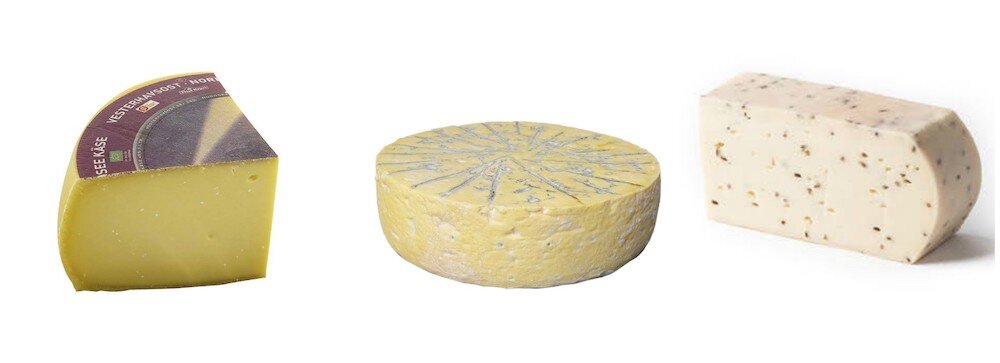7 Great Danish Cheeses You Should Know
When you think of Danish food, pickled herring and aquavit may leap to mind – but don’t overlook cheese. The Danish diet is dairy-rich, and cheese is considered to be a staple. Cheese is sliced and smeared daily for breakfast and lunch, layered on smørrebrød or iconic open sandwiches, and designated its own course at celebrations and holiday meals (naturally paired with Danish beer and snaps).
Danish cheese-making traditions stretch back to the Viking era, and the country’s fertile pastoral land and temperate climate make it an ideal dairy producer. Danish cheese production flourished in the 20th century with the advent of industrialization and technology, and Denmark became known for a number of cheeses such as havarti, fontina, and Dana Blu. However, this modernization also led to the loss of artisanal methods. Fortunately, this changed towards the end of the 20th century with a resurgence of producers recapturing traditional methods making handcrafted cheese. A number of these cheeses are available for export and worth getting to know.
Esrom
Esrom photo credit: Thise DK
This Trappist-style cheese was created in the 12th century by monks in the small village of Esrom in North Zealand. As time passed, the recipe was lost, until, centuries later, it was rediscovered in the 1930s by the state research dairy. It’s one of four Danish cheeses to have Protected Geographical Indication (PGI) status, meaning it can only be made in Denmark to specific Danish standards. Esrom is made from pasteurized cow’s milk, and has a semi-soft and supple paste riddled with small holes or eyes, and a washed rind. A pungent aroma belies a buttery-rich and fruity flavor, which becomes spicier with aging. It’s a terrific melting cheese and addition to cheese platters.
Photo credit: Them Andelsmejeri
Danbo is the most produced and consumed cheese in Denmark, and also has PGI status.* It’s a light yellow and semi-soft cheese made from pasteurized cow’s milk, with a smear-ripened and washed rind. Aged between 12 and 52 weeks, its flavor ranges from mild and slightly acidic with buttery and nutty notes to full on stinky and strong when extra-aged. Like many Danish cheeses, it’s also available with caraway seeds, in which case it’s known as King Christian cheese, named after the 19th-century monarch.
Tilsit Havarti
Tilsit Havarti photo credit ScanSpecialties
Tilsit Havarti is not your mild-mannered supermarket Havarti or Cream Havarti. This cheese shares a cheese-making tradition with German Tilsit, which originated in East Prussia, where Dutch settlers were attempting to recreate their beloved Gouda. The process went awry, and the cheese became infected with molds and bacteria, hence Tilsit was created. Tilsit Havarti, also known as Danish Tilsit, is made from pasteurized cow’s milk. It’s slightly milder than its German counterpart, while it has a more intense flavor and aroma than Danish Havarti. It has a brown-orange washed rind and a semi-firm texture, with a piquant flavor and pungent aroma.
Blå Kornblomst
Bla Kornblomst photo credit: Thise DK
Literally translated as blue cornflower, this organic cow’s milk cheese is luscious, rich, and velvety, with a paste that melts in the mouth. As the name implies, its flavor and aroma evoke sweet cream, buttery corn, and fresh hay. The cheese is produced in 400 cheese vats, where the milk is stirred by hand.
Mycella photo credit: CedarWolfFarm
This blue-green veined cheese is made from pasteurized cow’s milk on the tiny Danish island Bornholm in the Baltic Sea between Zealand and the southern coast of Sweden. The cheese is unique to Bornholm and is made with cow’s milk from the island’s dairy co-operatives. The rindless, semi-soft cheese is often compared to Gorgonzola, and has a distinct sweet and savory flavor, with salty, smoky, cherry notes. It’s a prominent feature in the local cuisine, most notably on an open sandwich of dark rye bread topped with smoked herring, chives, egg yolk, and crumbled Mycella blue cheese.
Thybo
Thybo photo credit: Thise
Straw-colored with flavorful crystals and butterscotch notes, Thybo is a medieval cheese, produced in the northwestern Thy region of Jutland, Denmark. It fell out of fashion before its resurgence in the late 20th century with the burgeoning artisanal cheese movement. Thybo is a firm cheese produced in the traditional method of kneading the salt into the curd by hand. The texture of the cheese is firm and smooth with random crystallization throughout. The cheese is aged for 10 months, and has a deep, nutty, sweet taste.
Vesterhavsost
Versterhavsost photo credit: Thise DK
Vesterhavsost (North Sea Cheese) is a semi-hard cheese made from pasteurized cow's milk. It started as a small niche cheese in 2008, and has developed into a large production and export. Vesterhavsost is similar to Gouda, with a smooth and slightly sweet paste with nutty notes. Produced from the milk of west Jutlandic cows it matures in a facility ventilated by the sea air for at least 30 weeks. Fyrmester or Fyrtårnsost (The Lighthouse Keeper or Lighthouse Cheese), is an extra-mature version, aged for at least 52 weeks, allowing flaky crystals to develop in its paste, yielding a hard cheese with a more concentrated taste and sweet notes of cooked milk and dulce de leche.








